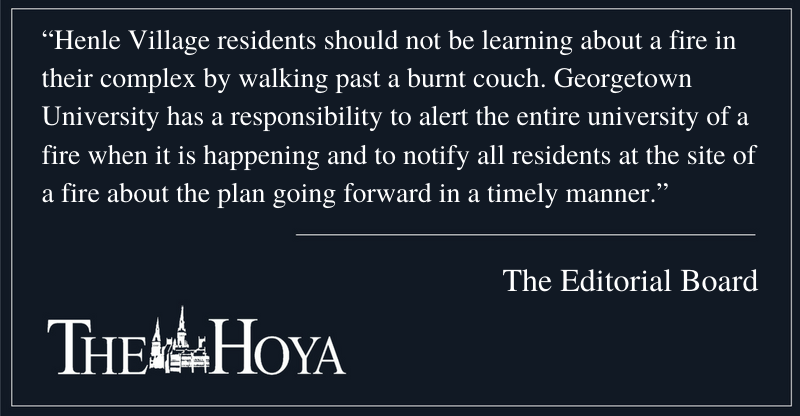In the early morning of Feb. 8, a fire broke out in Georgetown University’s Henle Village apartments. Yet the university failed to inform Henle residents when the fire occurred, according to resident Ben Gaver (COL ’22).
The university’s lack of communication during the Feb. 8 fire poses serious concerns about student safety. Georgetown must be more transparent and proactive in its communication with students about campus emergencies.
Though a university spokesperson confirmed the occurrence of the Feb. 8 fire in an email to The Hoya, the university has failed to offer any information about the extent or the cause of the fire and its reasons for not informing Henle residents about the incident.
Hyung Joon Nam (NHS ’21), who lives two floors above the apartment in which the fire occurred, was aware of the fire because he heard the fire alarms and smelled smoke, he wrote in a message to The Hoya. The residents were then instructed to wait at Epicurean and Company for about three hours before being allowed back into their apartments, according to Nam.
At no point on Feb. 8, however, were the residents in the rest of Henle’s towers notified about the fire, according to Gaver.
“I was unaware that there was a fire via the university, but I could hear voices, the fire alarm ringing in the distance and saw tons of chaos going on outside my window,” Gaver said in an interview with The Hoya.
Grace Nguyen (NHS ’21), who also lives in Henle, told The Hoya she was unaware of the incident until she saw a burnt couch in the courtyard the next day.
Henle residents should not be learning about a fire in their complex by walking past a burnt couch. Georgetown has a responsibility to alert the entire university of a fire when it is happening and to notify all residents at the site of a fire about the plan going forward in a timely manner.
Despite having emergency communication systems in place, the university did not use them Feb. 8. HOYAlert, the university’s emergency alert system, texted students the morning of Feb. 7 with a severe weather warning for rain and wind, but when a fire occurred in an on-campus apartment less than 24 hours later, no alert was issued. HOYAlert has notified students about previous campus fires, such as the Jan. 5 Healy Hall fire. Students have received alerts for less pressing incidents; they should have received a text Feb. 8.
Emergency alert systems are useless if they cannot reliably inform students about serious safety concerns. While students outside the specific tower were not directly affected by the Feb. 8 fire, it is deeply concerning that Georgetown did not contact residents of other Henle towers about the incident until Feb. 12. The university should have sent an alert about the fire as they combated it.
When Director of Residential Services Bill Huff finally emailed Henle residents Feb. 12 to notify them that a fire watch was being instituted throughout the complex, this communication was too little, too late.
“GU police officers will be walking around Henle Village checking stairwells and exterior of the buildings for fire or smoke throughout the evening,” Huff wrote.
While it is important the university is taking action to prevent further fires in Henle, it is unacceptable that residents must rely on campus police officers to somehow visually detect a fire as it occurs. This response indicates an alarming lack of faith from the university in its own apartments’ fire safety systems; students should not have to rely on a patrol the university threw together last minute if a fire breaks out overnight.
The entire university should have been notified about the fire Feb. 8, and Henle residents should have received information about fire safety in their complex sooner than four days after the incident. Georgetown must communicate with students more quickly and transparently about emergencies. Such a procedure would reduce confusion during and after emergency incidents and heighten students’ sense of safety while living on campus.
The university’s response to the Feb. 8 fire was unacceptable. If a fire happens in our apartment complex, please notify us.
The Hoya’s editorial board is composed of six students and chaired by the opinion editor. Editorials reflect only the beliefs of a majority of the board and are not representative of The Hoya or any individual member of the board.














